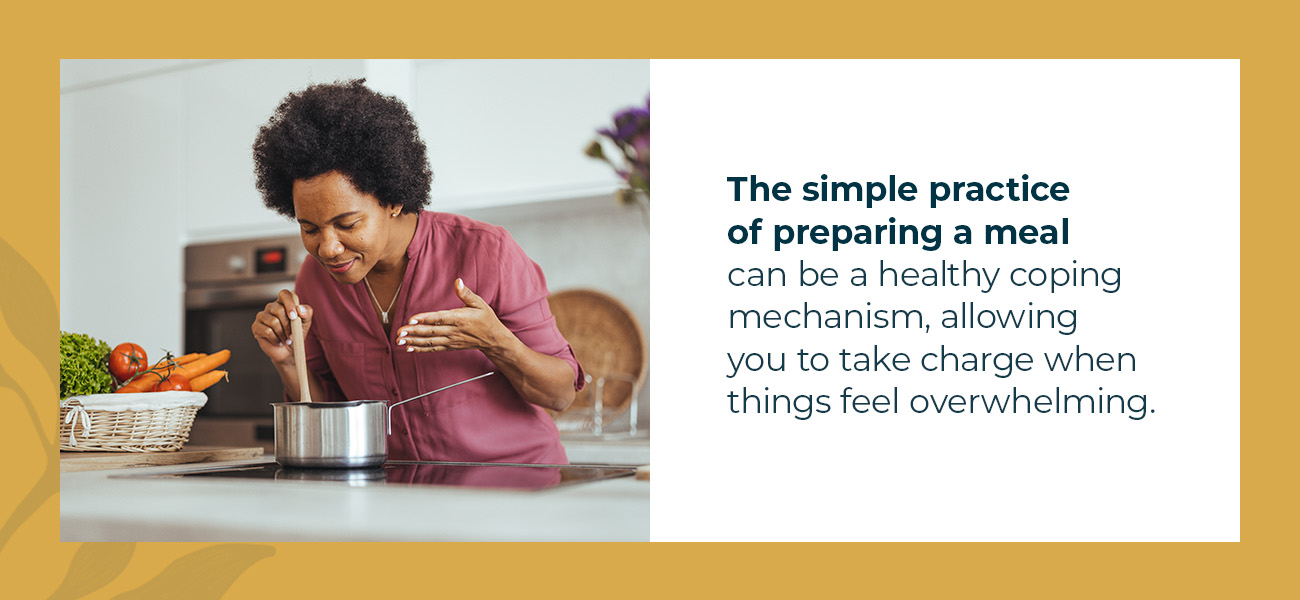Benefits of cooking during recovery

Overcoming the drug use disorder (SUD) is a personal process that looks different to everyone. However, for people in the early stages of recovery, the common experience is finding interesting activities that do not involve drugs or alcohol. While this can be challenging, adopting new hobbies like cooking is crucial to strengthening sober determination.
In addition to being a safe and pleasant time, developing your cooking abilities can also improve your mental and physical health. Here are five benefits of cooking during addiction recovery.
1. Create better habits
Returning to familiar environments, behaviors and behaviors previously related to drugs or alcohol consumption are one of the main reasons people experience frustrations in soberness. While relapses are not shameful, replacing old habits with new ones can help you stay awake. Learning exciting recipes is another common trigger to stay busy and reduce the risk of relapse due to boredom.
Additionally, those who are active addiction may not always be able to take care of themselves – cooking is an excellent way to relearn the method. Preparing meals, rather than ordering takeout or heading to the express train, is a great way to raise yourself and restore independence.
Even if you start with making very basic meals, daily cooking routines can help you build the structure of your life. Set schedules have little room for past or pursuing potential triggering experiences, allowing you to continue your healing journey.
2. Improve physical health
Medicines and alcohol can suppress your appetite and affect the body’s function and metabolize food. These metabolic and nutritional changes often lead to under-food intake and nutrient absorption, which is why many people who recover from SUDS show signs of malnutrition.
Understanding nutrition and honing your cooking skills is essential to adopting an holistic approach to healing. When you cook by yourself, you will understand your body better. As awareness increases, you may be more likely to choose nutritional options than processed and sugary foods.
While eating a balanced diet is good for anyone, here are the people who prepare healthy foods to help recover from addiction:
- Nutrients for recovery: A comprehensive diet is essential to recovering vitamins and minerals that may have been exhausted when used. Cooking allows you to play a role in helping your body correct nutritional imbalances.
- Strengthen immunity: SUD negatively affects your body’s ability to fight common infections like cold. Eating foods like red peppers, spinach, citrus fruits and ginger can help boost your immune system.
- Increase energy: It is completely normal to feel tired in the early stages of healing – your body needs time and energy to heal and repair itself. Including foods rich in healthy fats, protein in your diet and complex carbohydrates can give you the fuel you need and help you get more energetic.
3. Enhance your mental health

Prioritizing your emotional health is just as important as improving your physical health, especially since SUD usually occurs simultaneously with other mental health conditions. Furthermore, challenging emotions can be a common trigger for relapse. Although a balanced diet can relieve symptoms of anxiety and depression, the benefits of cooking for mental health are beyond nutrition.
Simple exercises to prepare meals can be a healthy coping mechanism that allows you to take responsibility if you feel overwhelmed. You can experiment and use creativity when you control which ingredients are used and each. Plus, you can strictly follow the recipes you make repeatedly to create familiar and comforting results. No matter which option you choose, you will be in the driver’s seat.
Confidence plays a key role in recovery too – when you believe in yourself, you are more likely to maintain newly discovered healthy habits, commit to treatment plans, and avoid relapses. Improving your cooking abilities can give you a sense of accomplishment and increase your self-esteem. Over time, you will master new technologies and become more confident in your kitchen, which can also expand into other areas of your life.
4. Enhance your cognitive function
After the initial evacuation phase, people on the recovery road often experience acute post-retreatment syndrome (PAWS). Symptoms of the paw develop as your brain adapts without the function of medication or alcohol and can last between six months and two years. They tend to be more emotional or psychological and can include cognitive effects, such as:
- Memory loss.
- Brain fog.
- Concentration issues.
One of the most important benefits of cooking in recovery is that this activity requires you to rely on a range of cognitive skills affected by your paws and can be an excellent way to enhance your mind. Collecting ingredients, following the recipe steps and using different cookware can all help you expand your attention span and increase your focus.
Every meal you prepare is an opportunity to restore cognitive ability. Make simple meals first, then gradually use more complex dishes.
5. Strengthen your social connections
Although soapy water can lead to isolation and loneliness, a lack of social connection can also lead to the development of addiction. Connecting with others is an important part of your recovery because your relationship is a key source of support. Cooking can be an excellent bonding experience that can help you build new connections or restart old ones. Whether it’s cooking with family and friends in your support group, you can make something delicious together.
If you are a beginner, you can take care of basic techniques such as chopping and measurement. Cooking with others allows you to learn tips and tricks and expand your cooking repertoire.
Why trust Diamond House Detox Rehabilitation?
At Diamond House Detox, we understand that the journey of recovery is very personal and requires a solution to your physical and mental health. This is why we prioritize comprehensive care strategies and specialize in treating concurrent diseases. Many of our clients have successfully achieved sober goals with the help of our experienced healthcare practitioners, psychological support and accompanying care services, which allow for personalized treatments and medication adjustments.
Once we complete our residential rehabilitation program, you can take the next step with our sober housing options to maintain rehabilitation and achieve overall wellness. These homes are a safe space where you can learn or re-learn basic skills such as grocery shopping and preparing meals to continue these practices as you transition to independent living.
Overcoming SUD is a lifelong commitment. In addition to seeking ongoing treatment and support to help you stay awake, finding activities you love and creating healthy routines can also enhance your recovery.
Maintain your recovery through a sober residence
Transitioning to everyday life can be a shocking aspect of recovery, but Diamond House detox can help here. We create a warm and enthusiastic environment where you have the ability to continue to exercise healthy habits such as preparing nourishing meals and pursuing hobbies that bring you happiness. Our goal is to make all of our clients live a more meaningful life.
In addition to providing rules and guidelines such as requiring you to do daily chores, we also implement evidence-based treatments and personalized care. This way, we enable you to build a solid foundation to stay awake and be the person you desire to be. In our sober home in Sacramento, California, whether you choose to share or private rooms, you can connect with others who share your goals.
Contact us today to learn more about our sober housing and how to incorporate practices such as cooking to enhance your recovery.





